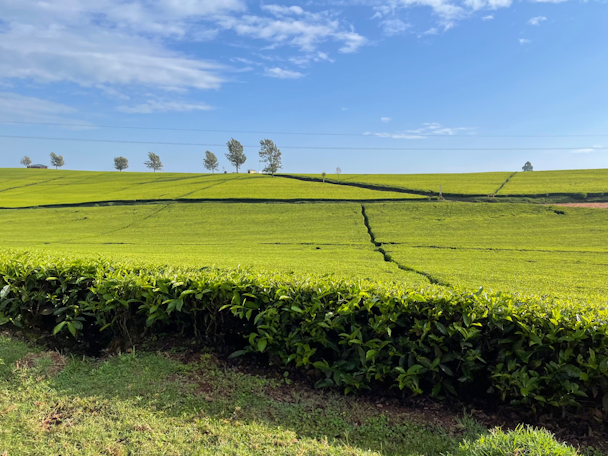Ekaterra CMO shares sustainability pledges and teases potential Unilever split
Ekaterra, the newly-formed division of Unilever’s tea brands, now the largest in the world, has set its sights on becoming net zero by 2030. Before presenting its commitments at Cop26 in Glasgow, chief executive John Davison and global chief marketing officer Aparna Sundaresh sat down with The Drum to discuss its ambitions to one day split from the consumer goods giant as part of its journey to become climate positive.

Ekaterra discusses its sustainability goals ahead of a potential split from Unilever/Image via Ekaterra
Ekaterra, which owns tea brands including Lipton, PG Tips and Pukka, officially spun off as a separate brand from Unilever back in October. Chief executive John Davison explains that this, alongside the potential for an eventual exit altogether, would drive its potential for significant leadership in the tea category, in the same ways as its peers and competitors “have been driving coffee for decades.”
Yesterday the brand presented its climate and nature goals of reducing emissions, restoring biodiversity and shifting fully to nature-based materials at Cop26 in Glasgow. Its pledges include: reducing greenhouse gas emissions 80% by 2030 from 2010 baseline (already reduced 66%); ensuring 100% sustainably-sourced teas by 2023 (98% today); 100% plant-based tea bags by 2025 (73% today); to have all packaging recyclable, compostable or reusable by 2025 (82% today); to maintain no waste to landfill from own operations; and to deploy regenerative agriculture for raw materials sourcing by 2030.
Global chief marketing officer Aparna Sundaresh explains that the tea market inherently lends itself to sustainability, which is why it is at the front and center of Ekaterra’s messaging. “It is one of the most natural products, with the simplest kind of manufacturing and supply chain processes. That gives us a unique opportunity to talk to our customers about the processing of their foods and drinks and the importance of that to sustainability.”
She goes on to say that involving the customer in the process of making the product through marketing engages them from the offset. “We find that if we say our product is sustainable and push our certifications, people don’t really lean in. It’s all about getting people to know the name, and adding color and texture and stories around what we do.”
It also talks up the fact that it doesn’t use plastic and uses biodegradable bags.
Ekaterra also has the certifications to back up its sustainability claims, Davison explains. For example, creating a partnership with the Rainforest Alliance in 2005 at “a time when most players weren’t showing an interest in sustainable sourcing, but we, as Unilever, did. We are now approaching 98% sustainably sourced, while the rest of the industry hovers around 25%.”
Davison says that partnerships with external bodies such as NGOs are crucial for brands seeking sustainability plaudits as “they keep you accountable. I expect their leaders to keep us on track, and that will keep us transparent by nature.”
Both Davison and Sundaresh agree that the legacy of Unilever’s sustainability efforts has given Eketerra its springboard, but “tea just doesn’t have the same plastic footprint as say household products, like shampoo.”
Davison’s comments perhaps allude to the fact that Unilever has been criticized in the past for its plastic pollution footprint. A report by the NGO Tearfund last year placed it third highest in the world after Coca-Cola and Nestlé – its annual footprint accounting for more than 70,000 tonnes of plastic waste, or 11 football pitches a day. Therefore the separation of church and state would likely accelerate its ambitions to climate positivity, as well as the overarching B-corp certification Davison wishes for.
Unilever more broadly aims to become net zero by 2039, as its chief executive Alan Jope told The Drum that “we believe putting sustainability at the heart of the company makes for better business.” Jope says this is partly because Unilever’s sustainability-focused brands “are growing faster, and we’ve saved 1.2bn euros through sustainable sourcing. But frankly, a world that’s on fire or underwater is not a good place to be selling anything.”
Jope explains that Unilever’s sustainability commitments are amplified by the attention it shows to ensuring workers across its supply chain are paid a living wage. “But again, it’s not done out of altruism – prosperous societies buy more tea and shampoo,” he concludes.
As the final days of Cop26 draw nearer, Davison says that the challenge now is for brands to set targets that are uncomfortable “because that is where we will make progress” – referring to the brand’s eventual aspirations to become climate positive through its sustainable business practices across the value chain.
Ekaterra’s potential split from its parent company will doubtless also be a daunting prospect, but if Davison and Sundaresh’s claims of the inherent sustainability potential of the tea industry are to be believed, perhaps the move will be what the brand needs to shake off Unilever’s plastic footprint and make its way closer to its climate-positive goals.

